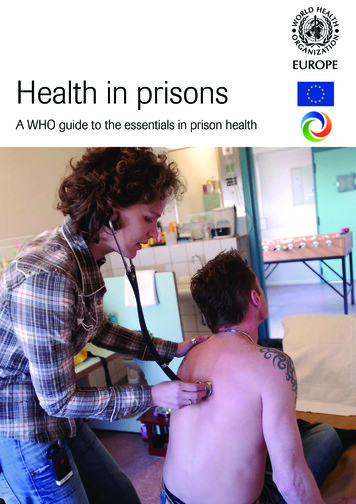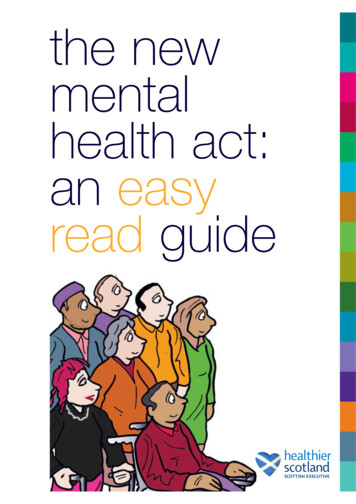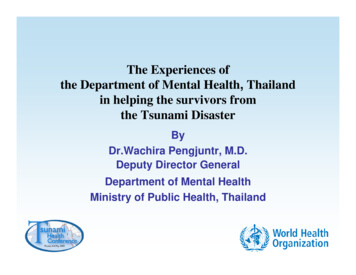
Transcription
Joint Mental Health CommissioningStrategy for Adults 2014-2019Developed in partnership with:NHS Ipswich and East Suffolk CCG, NHS West Suffolk CCG, Suffolk Constabulary and Suffolk County Council
You said: GPs lack the time. Sometimesthere can be a long wait to see themwhen help is needed immediately. Doctorsnaturally reach for prescription medicinerather than counselling or information.You said: to prevent crises from happeningwe need easy access to appropriate supportfrom skilled multi-agency teams.You said: we need 24 hour access to careand support that is closer to home; help inunderstanding what the early warning signsare; detailed care plans and barriers to otherservices removing; services in A&E needto improve.You said: it was difficult to get back intoservices unless you were in crisis.You said: you want to be listened to.I know best what I need to feel betterand what works for me.You said: we need a safeplace to go in crisis.You said: that there is a stigma attachedto mental illness and that mental healthneeds to be normalised.You said: we need quick access tosupport for significant life events, alcoholor substance misuse. We need up to datecare plans and GPs need access to upto date information.You said: we want to see all services incrisis becoming more joined up.Communication still needs to get better.You said: recovery should not just bethe responsibility of people in secondarycare. More partner organisations needto be involved.You said: carers and patients needaccess to courses in Recovery Colleges.You said: stimulating therapy such asart, drama and play should be utilised.There should be recovery courses anda recovery college.You said: we need 24/7 responsiveservices available - telephone staffedby skilled people.You said: feelings of isolationexacerbate mental illness.
For Consultation onlyAll feedback toalison.leather@ipswichandsuffolkccg.nhs.ukBy noon on 7 June 2015Joint Mental Health Commissioning Strategy for Adults(2014 – 2019)Developed in Partnership withIpswich and East Suffolk CCG; West Suffolk CCG, SuffolkConstabulary and Suffolk County CouncilVersion ControlVersionDateV102.06.2014Edited byAlison LeatherV206.10.14Alison LeatherV331.10.14Alison erg/AlisonLeatherJohn Hague/AlisonLeatherAlison LeatherV728.01.15Alison LeatherV811.02.15Alison LeatherV905.03.15Alison LeatherSuffolk Integrated Mental Health rolContributionsDraft for discussionDraft with FeedbackInsert from ESRF feedbackJH FeedbackDS FeedbackService Userfeedback/SuffolkConstabulary commentsSCC/MC CommentsService User feedbackRecovery & WellbeingSCC FeedbackPage 1
ContentsPageSection 1: Introduction3 Executive SummaryIntroductionStrategic PlansEquity and Excellence- Liberating the NHSTransforming Social Care- Putting People First3791112Section 2: Background15National ContextRegional ContextLocal ContextLegal Framework16212125 Section 3: Case for Change & Co-production26Section 4: Delivering Better Outcomes32Section 5: Making it happen34 Prevention and Early InterventionCrisisCrisis care and supportSuicide preventionRecovery and Self-managementRecovery collegesPersonal health budgets34373941434546Section 6: Measuring Success47Section 7: Research and Education48Section 8: Recommendations51Suffolk Integrated Mental Health StrategyPage 2
1.1Executive SummaryThere is “no health without mental health”. Mental wellbeing is fundamental to aperson’s quality of life. It is linked to good physical health, better cognitive andphysical functioning, increased productivity, better interpersonal relationships, longerlife expectancy and a greater capacity to deal with stress and adversity.The strategy is prepared jointly by Ipswich and East Suffolk and West Suffolk ClinicalCommissioning Groups, Suffolk Constabulary, Suffolk County Council and peoplewho use mental health services on behalf of the people of Suffolk. We continue to becommitted to people’s mental health needs so that they have independence, choiceand control in how they live their lives. The strategy is integral to and designed tocomplement the overarching Suffolk Health and Care Review carried out in 2013/14.The strategy will drive commissioning, planning and decision making processes forpeople with mental health needs in Suffolk.Our vision is to provide excellent, safe, sound, supportive, cost effective andtransformational services for people with mental health needs that in turn promoteindependence and are empowering, wellbeing, and choice that are shaped byaccurate assessment of community needs.’We will bring this vision closer by improving outcomes for mental health in sevenstrategic domains between 2015 and 2020. More people will have good mental health More people with mental health problems will recover More people with mental health problems will have good physical health More people will have a positive experience of care and support Fewer people will suffer avoidable harm Fewer people will experience stigma and discrimination More people from ethnic minority backgrounds will have access to localmental health services.Suffolk Integrated Mental Health StrategyPage 3
What we know: Locally there are strong links between social deprivation and mental ill health.There is a clear correlation at practice level between severe mental illnessand deprivation, according to Quality Outcomes Framework data. The most recent mortality data shows that among residents of Suffolk incalendar year 2013, there were 67 deaths from self-harm. In Suffolk analysishas shown a significant association between death rates and deprivation.Mental ill health can negatively affect an adult’s ability to work and to live a full life. Italso affects their wider health and over a half of older people in acute hospitals for aphysical problem also have a mental health condition. At any one time one in sixadults has a mental health problem and the proportion affected is much higher forthose who are in prison. This is important in Suffolk where three prisons are based,one of which is the largest in Europe.Mental illness still has a stigma and is often not recognised. For example it isbelieved that a quarter of people over the age of 65 living in the community havesymptoms of depression serious enough to warrant intervention, but only a third ofthem discuss it with their GPs, and only half of those get treatment. Research hasidentified that many vulnerable adults experience complex health and socialproblems, including mental health issues, and there is evidence of poor mentalhealth as both consequence and cause of inequalities and exclusion.It has been estimated that for every 1 invested in early identification, treatment and/or care for mental health problems up to 7.89 is saved. The majority of thesesavings sit outside the NHS or social care. Improving the mental health andwellbeing of those in Suffolk will enhance the lives of individuals and families andalso increase economic prosperity within Suffolk.In summary this strategy will drive a partnership approach to developing support forpeople with mental health needs in Suffolk. It will ensure we sustain the bestpossible quality of life for them and their families. We will do this by focusing on thefollowing key priorities:Suffolk Integrated Mental Health StrategyPage 4
Mental health prevention and early intervention including improving qualityin services offered locally and at surgeries Integrated operating models and responses for example people fromdifferent agencies working better together Crisis Care and suicide prevention Rehabilitation and recovery including supporting people with complexneedsThere are also key links to other areas that have been identified as priorities. Theseinclude: Children and young people including the transition from childhood toadulthood Substance misuse including alcohol. Those with Learning Disabilities and/or autistic spectrum disorders.Minority PopulationsResearch shows men from Black Caribbean, Black African, and other Black groupsare more likely than other groups to be detained under the Mental Health Act.Research also shows that the highest levels of depressive episodes are reported byPakistani women and Indian women. The reasons for these differences need to beunderstood and effective support made available.The public sector has a duty to ensure that there is equal access to mental healthservices for all minority populations (Equality Act 2010) including migrantpopulations, Black and Minority Ethnic communities and travellers.In general, according to the Mental Health Foundation people from BMEcommunities are: More likely to be diagnosed with mental health problems More likely to be diagnosed and admitted to hospitalSuffolk Integrated Mental Health StrategyPage 5
More likely to experience a poor outcome from treatment More likely to disengage from mainstream mental health services, leading tosocial exclusion and a further deterioration in their mental health.The report by the Joint Commissioning Panel for Mental Health recommends that“Commissioners need to fully understand the mental health needs of BMEcommunities, and their experience of the local mental health system. Commissionersalso need to recognise that the organisational culture and structure of NHS care canact as a barrier to overcoming health inequalities among BME groups”.It is a fundamental expectation that the mental health workforce will have thenecessary cultural competence to be able to support all users including BMEcommunities and understand the impact of racism and discrimination has on theirwellbeing, and to effectively embed a human rights approach in practice.Clinical commissioning groups (CCGs) and Suffolk County Council (SCC) have theresponsibility for commissioning the best possible services for their patients and localpopulation. As this includes populations that are diverse and multicultural, a singleand uniform model of mental health care may not be appropriate. Instead, culturaldifferences and ethnic diversity in the local population will require services that arecustomised to varied needs. This is arguably more important in mental health thanin any other aspect of health care – culture, language, religious beliefs and ethnicitywill all have a disproportionate impact on the origin, manifestation, experience andtreatment of mental ill health.This strategy also considers the mental health needs of military veterans both theelderly and those more recent veterans. The most common disorders among recentor younger veterans are depression, anxiety disorders, Post Traumatic StressDisorder (PTSD) and substance misuse most notably that of alcohol.Suffolk Integrated Mental Health StrategyPage 6
Section 1.2 Introduction1.1 The importance of mental health and wellbeing cannot be understated. It affectsand influences the lives of individuals, families, communities and societies. Thosewho work in mental health services and live with long term conditions are well awareof this, and are keen to get on to make changes. Change like this take time, howeverwith a clear strategy the whole population can benefit as this strategy comes to life.The purpose of this strategy is to improve the mental health and wellbeing of thepopulation of Suffolk so reducing health inequalities, improving physical wellbeing,social interactions and job prospects.1.2 This strategy seeks to implement national drivers to promote parity acrossmental and physical health care, good mental health and wellbeing, whilst furtherimproving the quality and accessibility of services for people who have mental healthproblems. It also seeks to co–produce with providers, the public and service users todevise local approaches to mental health services.1.3 Good mental health and wellbeing for all is at the heart of our strategy and wewill develop services that are individually tailored, aim to prevent mental ill health andcrisis and responsive in nature. This will include promoting mental health throughawareness raising in universal services, delivering targeted information and supportto marginalised community groups, and information and signposting to individuals tosupport self-help.’It will also include thinking about new ways of delivering mental health interventionsthat: Promote mental health through early access to good information, effectivetreatments as well as a ‘whole population’ approaches to support good mentalhealth. Work together to maximise opportunities for new models of service to offermore comprehensive and coordinated approaches to helping people withmental ill health. Support people to access the services they require and services need to beavailable to offer prompt and early treatments.Suffolk Integrated Mental Health StrategyPage 7
Ensure people with mental ill health are able to access support for other longterm conditions (e.g. diabetes, coronary heart disease) in the same way thatsomeone with a long term physical health problem should be able to accessmental health support. Make sure a person’s mental health is considered as part of the assessmentof everyone’s health.1.4 The strategy has been developed through dialogue and co-production with awide cross-section of mental health service users and carers. It will support thecommissioning of fully integrated health and social care services across mentalhealth, physical health, people with autistic spectrum disorders and learningdisability. It will ensure there is a seamless transition between care pathways andservice boundaries including adolescents moving into services for adults and foradults moving into services for older people. Services will be accessed through asingle point and be designed to meet the care needs of our patients based on actualneed not their age.1.5 The strategy is underpinned by the following principles: People will understand the importance of good mental wellbeing People will have good mental health People with mental health problems will recover People with mental health problems will have good physical health, andpeople with physical health problems will have good mental health People with mental health problems will be empowered and have the bestpossible quality of life empowered by a social model of disability.Suffolk Integrated Mental Health StrategyPage 8
Section 1.3 Strategic PlansWest Suffolk CCGFinal refresh of the 2 year operating plan is available on the website atIpswich and East Suffolk CCGFinal refresh of the 2 year operating plan is available on the website at1.1 The Suffolk Health and Wellbeing BoardThe Board has set out a vision for the people of Suffolk to live healthier, happier liveswith reduced inequality of life expectancy. They have set four strategic outcomes: Every child in Suffolk has the best start in life Suffolk residents have access to a healthy environment and takeresponsibility for their own health and wellbeing Older people in Suffolk have a good quality of life People in Suffolk have the opportunity to improve their mental health andwellbeing.1.2 Suffolk County CouncilThe Council takes responsibilities for caring for vulnerable people very seriously.New operating models are being developed across its social care services for adultsand children which have early intervention and prevention at their heart.In turn, this will enable people to live more independent lives and reduce the need formore intensive and costly interventions later on. Forging strong links with the NHSand the voluntary and community sector will not only help us offer a seamless,holistic approach to meeting the needs of Suffolk’s most vulnerable, but also preventthose less in need falling into crisis by supporting them to remain livingindependently in their community.A joined-up approach across organisations that considers the needs of the wholeperson, rather than simply treating a particular condition, will help people that fall intoSuffolk Integrated Mental Health StrategyPage 9
crisis to quickly get the help they need so that they are able to return to independentliving as possible as soon as possible.Supporting Lives, Connecting Communities is based on having a varied marketfor care and support which offers the people of Suffolk flexibility and choice.It aims to: Influencing communities and people so that it is easier for them to live moreindependent lives without on-going formal intervention Providing responsive short-term support to help people regain independence Re-designing the statutory assessment system so that it is streamlined, andoffers real choice and controlThe Care Act 2015 has “wellbeing principles” which underpin the entire legalframework and become the defining purpose for care and support. When peopleneed an assessment the focus will be on their strengths capabilities and assets aswell as needs.The council has new universal obligations to all local people to prevent, reduce ordelay needs for care and support, to provide information and advice and to promotequality and diversity in the market to meet people’s choices.Care and support plans will focus on the outcomes people want and create waysthey can link to what’s in their community to achieve this without recourse totraditional social care.When people lack capacity or find it hard to engage the council will have a duty toprovide independent advocacy to assist in assessment, care planning andsafeguarding. There is also a duty to assess young people and young carers inadvance of their 18th birthday and this can and this can be at whatever age is mostappropriate. Safeguarding Adults Board will be a statutory body.For the first time carers will have an equal entitlement to assessment and outcomefocused care and support plans and the Act encourages “whole family thinkingplans”.Suffolk Integrated Mental Health StrategyPage 10
People will be entitled to a personal health budget as part of their care and supportplan.1.3Suffolk ConstabularyThe Police and Crime Plan 2013-2017 outlines the vision and mission of the localConstabulary. It sets out a vision to make Suffolk a safer place in which to live, work,travel and invest. The mission statement goes on to highlight the following keyoutcomes: To reduce crimes causing most harm to our communities To reduce anti-social behaviour To improve the satisfaction of our customers To build the confidence of our communitiesThe Police and Crime Commissioner has outlined four objectives to achieve thisincluding to care for victims and vulnerable people, including protecting vulnerablefamilies and improving trust and confidence within the criminal justice system. Thereis also a commitment to support a multi-agency approach in supporting people withmental health needs through delivery of the Mental Health Crisis Concordat (2014)Section 1.4 Equity and Excellence- Liberating the NHSThe NHS White Paper was published in July 2010 and sets out the Government’slong term vision for the future of the NHS. This vision builds on the core values andprinciples of the NHS- a comprehensive service, available to all, free at the point ofuse, based on need, not ability to pay. It sets out how: Patients will be put at the heart of everything the NHS does; There will be a focus on continuously improving those things that really matterto patients- the outcome of their healthcare; and Clinicians will be empowered and liberated to innovate with a freedom tofocus on improving healthcare services.The aspirations for mental health are: The commissioning of services will be transferred to groups of GPs under theGP consortia with the exception of specialised mental health services that willbe the responsibility of the National Commissioning BoardSuffolk Integrated Mental Health StrategyPage 11
The White Paper states that choice of both treatment and provider of care willbe extended in to some mental health services from April 2011. Theimportance of this decision to enable effective patient choice is particularlyacknowledged for mental health and community services A set of payment by results currencies for adult mental health services will beintroduced from 2012/13. Payment mechanisms to support the commissioningof talking therapies will also be formulated Mental health outcomes will be included in the NHS outcomes framework.Other key points that will in turn support our local strategy are: Further exploration of the potential to use personal health budgets; Incentives for quality improvements, and Closer working between health and social care.Section 1.5 Think Local Act Personal (TLAP)Think Local, Act Personal is the sector wide statement of intent that makes the linkbetween the Government's new vision for social care and Putting People First. It hasbeen finalised as the way forward for personalisation and community-based support.It came into force on 1 April 2011.Think Local, Act Personal was originally released for comment in November 2010and asserts that councils, health bodies and providers need to work morecollaboratively to personalise and integrate service delivery across health and adultsocial care by making vital public funding go further. It also recognises thecontribution that individuals, families, carers and communities make in providing careand support both to those who are publicly funded and those who either pay forthemselves or rely on family carers.They are: Universal services - general support and services available to everyone,including transport, leisure, education, health, housing, community safety andaccess to information and advice;Suffolk Integrated Mental Health StrategyPage 12
Early intervention and prevention - support, available to assist people whoneed a little more help, at an early stage to stay independent for as long aspossible. The may include support to recover from the effects of illness andhelp to manage long term conditions; Choice and control - self-directed support that means having servicesavailable to meet people’s needs rather than people having to fit in with theservices on offer.; and Social capital - making sure everyone has the opportunity to be part of acommunity and experience the friendships and care that can come fromfamilies, friends and neighbours.The direction is clear; to make personalisation and self-assessment, including astrategic shift towards early intervention and prevention, the cornerstone of publicservices. In social care this means every person across the spectrum of need,having choice and control over the shape of his or her support in the mostappropriate setting. This is a challenging agenda, which cannot be delivered bysocial care alone.To achieve this sort of transformation across Suffolk it will mean working acrossboundaries of social care such as housing, benefits, leisure, transport and health.Major transformational change in Suffolk will be delivered through the Health andCare Review made up of key stakeholders across the system and based on theimplementation of: A health and independence service model including timely access to healthand social care. Efficient and effective support and care.These major programmes of work are in progress and include working across thesector with partners from independent voluntary and community organisations toensure a strategic balance of investment in local services.There is an expectation that there will be changes in the way people use and accessurgent and emergency services. Patients with a long term or chronic condition will befirmly in control of accessing a range of local health and social care services thatSuffolk Integrated Mental Health StrategyPage 13
meet their own personal needs. Patients will only be treated in hospital settings whenthis is the best place for them to be. The system is also committed to ensuring thereis a parity of esteem for mental health services.As part of the system wide commitment to the Crisis Care Concordat 2014 peoplewho are detained under section136 of the Mental Health Act will only be detained inpolice cells in exceptional circumstances. Suffolk Constabulary will work with partneragencies and organisations to ensure patients receive timely and appropriate care attimes of crises. They will predominantly be taken to health based places of safety toensure they receive this meaning that detention in Police Investigation Centres isonly used in exceptional circumstances.Through strong partnership links Suffolk Constabulary will work to also help thosebefore a point of crises and in periods of recovery to help prevent repeat need andservice use. Links into the criminal justice system and police custody areas withhealth and asocial care partners will also help to identify and support people withmental health needs.Suffolk Integrated Mental Health StrategyPage 14
Section 2: Local and national provenanceThe Joint Mental Health strategy sets out the vision for Mental Health services inSuffolk. The strategy is consistent with the approach being taken within the contextof the Suffolk-wide Health and Care review and will be delivered with the UrgentCare and Health and Independence Programme Boards, which both hadmembership including clinicians and Healthwatch Suffolk.Integrated Health & and Care Service PathwayPrevention & early intervention – amental health clinicians in thecommunity working in multi-agencyteamsRecovery – services thatenable people stay in control oftheir life despite their mentalhealth problem within theIntegrated NeighbourhoodTeamsCrisis and suicide – specialistservices and urgent care to supportpeople with severe and enduringmental health problems to preventpatients reaching crisis includingemergency access to crisisinpatient care.Suffolk Integrated Mental Health StrategyPage 15
2.1 National ContextMental illness is the single largest cause of disability in the UK and each year aboutone in four people suffer from a mental health problem. The cost to the economy isestimated to be around 100 billion annually – roughly the cost of the entire NHS. No Health without Mental Health - February 2011: aims to improve mentalhealth and wellbeing and to improve outcomes for people with mental healthproblems. The following strategic outcomes have been defined:1. More people will have good mental healthMore people of all ages and backgrounds will have better wellbeing and goodmental health and fewer people will develop mental health problems2. More people with mental health problems will recoverMore people will have a good quality of life – greater ability to manage their ownlives, stronger social relationships, a greater sense of purpose, improved chancesin education, better employment rates and a suitable and stable place to live3. More people with mental health problems will have good physical healthFewer people with mental health problems will die prematurely and more peoplewith physical ill health will have better mental health4. More people will have a positive experience of care and supportCare and support, wherever it takes place, should offer access to timely, evidencebased interventions and approaches that give people the greatest choice andcontrol over their own lives, in the least restrictive environment; and should ensurepeople’s human rights are protected5. Fewer people will suffer avoidable harmPeople receiving care and support should have confidence that the services theyuse are of the highest quality and at least as safe as any other public service6. Fewer people will experience stigma and discriminationPublic understanding of mental health will improve and, as a result, negativeattitudes and behaviours to people with mental health problems will reduceSuffolk Integrated Mental Health StrategyPage 16
Closing the Gap - January 2014: aims to bridge the gap between long termambition and shorter term action. It describes how changes in local serviceplanning and delivery in the next two or three years will make a difference tothe lives of people with mental health problems. It sets out 24 areas wherepeople can expect to see, and experience, the fastest changes. These willdefine our priorities within the context of this strategy.They are about mental health care and treatment, work across the entirehealth and care sector to reduce the damaging impact of mental illness andimprove mental wellbeing. In addressing these priorities, we will also defineour commitment to working with many partners across the voluntary sector –from national charities to local community groups.Suffolk Integrated Mental Health StrategyPage 17
The 24 areas are as follows:1. High-quality mental health services with an emphasis on recovery should becommissioned in all areas, reflecting local need2. We will lead an information revolution around mental health and wellbeing3. We will, for the first time, establish clear waiting time limits for mental healthservices.4. We will tackle inequalities around access to mental health services5. Over 900,000 people will benefit from psychological therapies every year.6. There will be improved access to psychological therapies for children andyoung people across the whole of England7. The most effective services will get the most funding.8. Adults will be given the right to make choices about the mental health carethey receive.9. We will radically reduce the use of all restrictive practices and take action toend the use of high risk restraint, including face down restraint and holdingpeople on the floor10. We will use the Friends and Family Test to allow all patients to comment ontheir experience of mental health services – including children’s mentalhealth services11. Poor quality services will be identified sooner and action taken to improvecare and where necessary protect patients12. Carers will be better supported and
Suffolk Integrated Mental Health Strategy Page 24 Post-natal depression is estimated to affect 2% of women. Post-traumatic stress disorder is estimated to affect up to 7% of women after delivery. Post-natal psychosis is rare, estimated to affect 1-2 per 1000, and there is an increased risk in women with a pre-existing serious mental illness.










